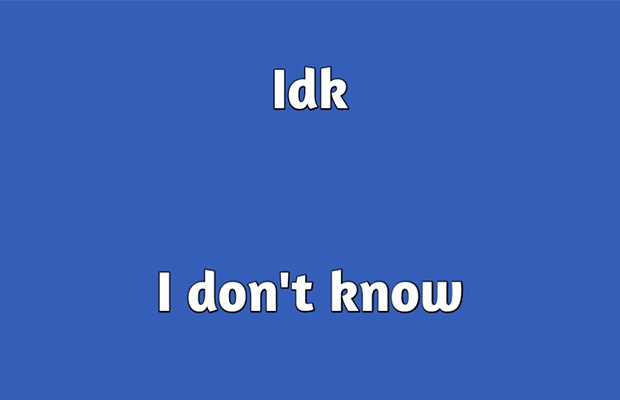The internet community is amazing for how quickly it pushes linguistic boundaries. As a result of news and social media, new words, phrases, and #hashtags are continuously developing on Twitter. One of the more widely used acronyms for I Don’t Know on the internet is used in memes and casual communication.
What does IDK mean? It means In text speak and online chat forums, the phrase “I Don’t Know” is frequently used.
Read on to discover what IDK means and how to use it.
Table of Contents
IDK Meaning
Idk is part of the newly developed dialect called text speaks or This dialect, known as SMS, is most frequently used in casual conversations, particularly when sending text messages or instant messages. The phrase idk has been part of text speak since at least 2002.
But don’t bet that someone who isn’t as tech- or text-savvy will understand what the phrase means. The abbreviation is most frequently used and understood by younger generations (think generations Y and Z).
According to Google Trends, the US, Poland, and Moldova are the countries where IDK is most frequently used. Beginning in 2007, the term’s usage on the internet really started to take off. With a focus on memes, the abbreviation’s popularity increased noticeably once more during the current global pandemic, perhaps reflecting people’s uncertainty and confusion about the state of society during the lock-down period.
Where Does IDK Come From?
The English-speaking nations in the United States are where this abbreviation first appeared. “IDK” had been used mainly to replace the English phrase “I don’t know”. Then, this expression grows in acceptance. It appeared in the Urban dictionary in 2003, which has the abbreviated form of “I don’t know” as its definition.
The phrase is now used not only in French-speaking communities but also globally. After that, everyone could access it thanks to the development of instant messaging. With the advice to save time, it is very simple to adopt.

How To Use IDK?
IDK should be used as shorthand for “I don’t know” in text and instant messaging to express uncertainty when trying to come up with an answer to a question, or when trying to describe something unknown.
Here are a few proper ways to use IDK in text:
- IDK what that means.
- IDK about that.
- Although the store should be open by now, I’m not sure.
Saying IDK out loud to a group of friends will likely result in many laughs and self-inflicted embarrassment, but avoid doing it in front of others unless you have no shame.)
Though a few variations have emerged over time, its semantics and meaning have not changed.
“IDEK” And Other Variations
In messaging platforms, there are a few variations of IDK that are widely used. You can capitalize or not capitalize any of these variations. While online slang should be avoided in many professional contexts, IDK can be used to reply to messages quickly.
A common variation is “IDEK” or “I don’t even know.” For example, “IDEK who that is.”
You can use the “IDW,” or “I don’t want,” shorthand to show you don’t want something or when you don’t want to do something. For example, “To the park, IDW.”
Use “IDTS,” or “I don’t think so,” to express subtle doubt and uncertainty. For example, if you’re not sure whether or not the keys are in the house, respond with “IDTS.”
“IDC,” or “I don’t care,” should not be confused with IDK, but you can use them together.
For example:
- Person 1: “Who was that?”
- Person 2: “idk and idc”
IK (I know), another widely used online abbreviation that is most frequently used in text messaging, stands in opposition to IDK. Alternatively, you can use “IKR” which translates to “I know, right?” and is usually applied in ironic contexts.

